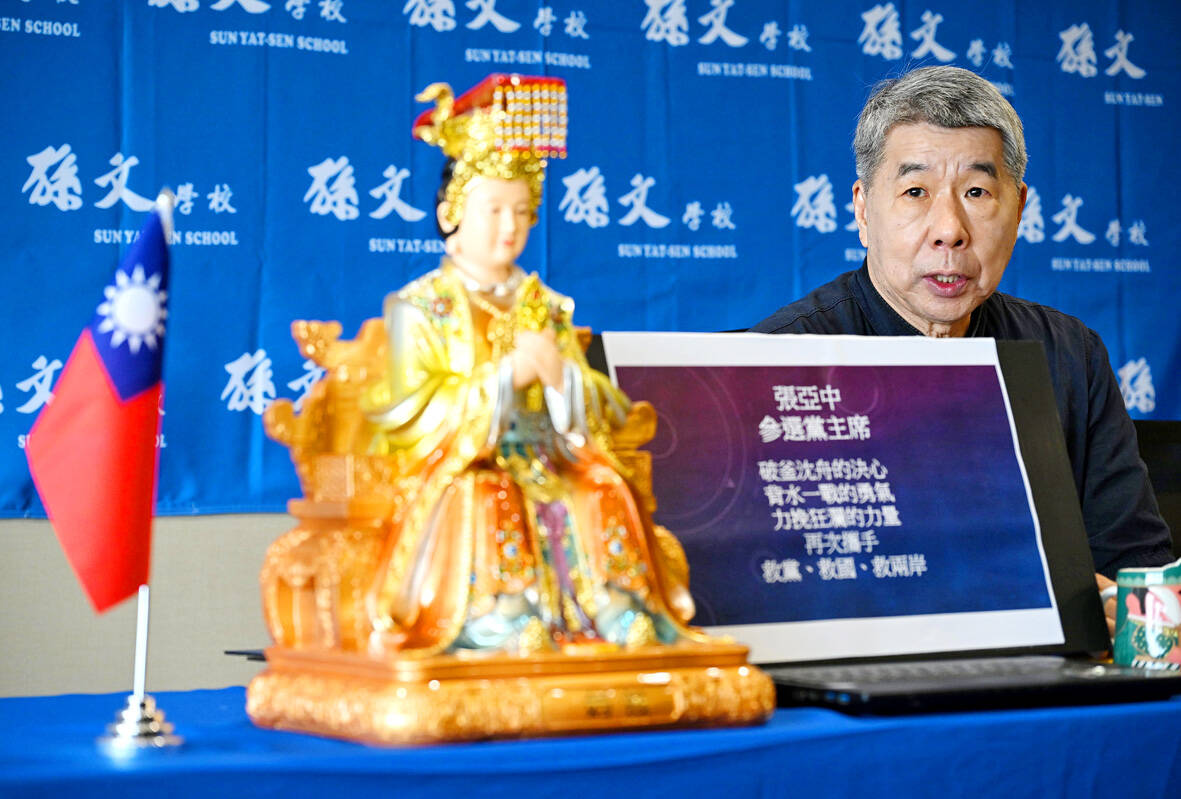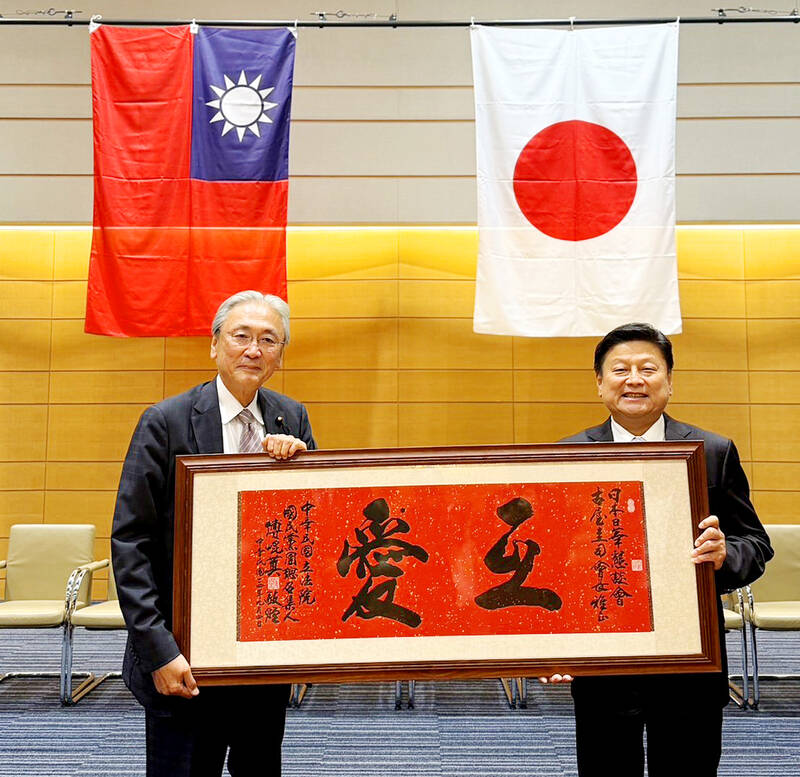Next week, candidates will officially register to run for chair of the Chinese Nationalist Party (KMT). By the end of Friday, we will know who has registered for the Oct. 18 election.
The number of declared candidates has been fluctuating daily. Some candidates registering may be disqualified, so the final list may be in flux for weeks.
The list of likely candidates ranges from deep blue to deeper blue to deepest blue, bordering on red (pro-Chinese Communist Party, CCP). Unless current Chairman Eric Chu (朱立倫) can be convinced to run for re-election, the party looks likely to shift towards more hardline pan-blue positions.

Photo: Screenshot from Eric Chu’s Facebook page
Estimates cited by the Chinese-language United Daily News from inside the KMT suggest that of the approximately 450,000 eligible KMT members, based on past elections, they expect around 200,000 to vote this time. Of those, the estimate is that around 50,000 will be from the “military faction,” roughly 80,000 influenced by local patronage factions and approximately 60,000 will vote “independently.”
Candidates are already vying to gain the support of the military and local factions, as well as supporters of popular favorite Taichung Mayor Lu Shiow-yen (盧秀燕), who has ruled out running.
The high cost of running may cause some of the candidates to drop out. Candidates must pay a registration fee of NT$200,000, an election administrative fee of NT$3 million, and a deposit of NT$10 million, totaling NT$13,200,000 (US$435,600). Though the NT$10 million deposit is refundable if the candidate meets certain conditions and can be secured with a promissory note, this is still a costly endeavor.

Photo: Chang Chia-ming, Taipei Times
This is no mere by-election, but potentially a full four-year term if the winner can successfully steer the party through the 2026 local and 2028 elections. Typically, if an election goes poorly, the chair is expected to resign to take responsibility.
Additionally, unlike in many of the recent chair elections, the KMT has strong momentum. According to Formosa polling, the party has, for the first time in a long time, the highest favorability rating among all major political parties.
Three potential candidates are not officially declared, but two are openly considering it. These three are the biggest heavyweights in consideration.

Photo courtesy of the office of Fu Kun-chi
JAW SHAW-KONG
The KMT’s vice presidential candidate in last year’s election and media mogul Jaw Shaw-kong (趙少康) has said that if Lu, Chu or former Taipei Mayor Hau Lung-bin (郝龍斌) runs, he will not. It is likely that Hau will run.
Jaw founded the influential Blue Fighters (戰鬥藍), a loose grouping of largely Taipei-based deep blue figures. If he does not run, he could still be a factor if he throws his weight behind Hau.
Chu appears to want Jaw to run, and offered him a seat on the KMT Central Review Committee, which would qualify him to run as candidates must have served on that committee or the central committee.
Jaw was a founder of the New Party, but left as the party shifted from being deep blue pro-unificationist to outright red pro-CCP.
HAU LUNG-BIN
Hau has some problems as candidate. Traditionally, a two-term Taipei mayor’s career prospects would include a run at the presidency. Instead, his political fortunes cratered.
He ran twice before for KMT chair, losing by large margins both times. He also failed running for a legislative seat in Keelung, a humiliating defeat for a major political figure.
Hau and his successor as Taipei mayor and founder of the Taiwan People’s Party (TPP), Ko Wen-je (柯文哲), have had a contentious relationship and there are fears in the KMT that he would be a risk to the KMT-TPP alliance. Hau has been offering olive branches to Ko and the TPP in recent days.
On the positive side for Hau, he is very qualified, could have the backing of the Blue Fighters and is the son of legendary former general and premier, Hau Pei-tsun (郝柏村), so he is potentially competitive with the military faction.
Hau was an early stalwart of the New Party, but stayed until 2005, well after the party had transitioned to a red party.
He has outlined three guiding principles he would uphold as KMT chair: the party will not pander to China, submit to the US or cater to Japan. If he wins, there will be considerable angst among Taiwan supporters in Washington and Tokyo.
FU KUN-CHI
KMT legislative Caucus Convener Fu Kun-chi (傅?萁) has reportedly been canvassing support for Chu to run for re-election, but with Chu looking increasingly out of the race, Fu has reportedly expressed “a very strong willingness” to run and claims many have been pushing him to do so.
He is also problematic and may not qualify. He is a local patronage faction politician known as the “King of Hualien,” and has been in and out of jail repeatedly for financial crimes.
Fu may not qualify because the latest rules state that if a party member has had their party membership revoked and kicked out of the party, they may not run. This happened to Fu after he lost a KMT primary in 2009 and ran as an independent.
His supporters claim this rule does not apply retroactively. If he does run, expect a fight over this.
The National Association of Retired Police Officers is encouraging him to run and promises to endorse him. This could help him with the military faction.
Other patronage faction figures distrust him — especially the Yunlin Chang clan — but deals could be made to bring them onside.
Fu is more pragmatic than Hau, but has extensive connections in China. He is likely less reflexively distrustful of the Americans and Japanese, but his propensity for wheeling and dealing could lean him towards a more accommodating Beijing.
LO, CHENG AND CHANG
Two other candidates worth watching — legislator Lo Chih-chiang (羅智強) and former legislator Cheng Li-wun (鄭麗文) — both have a gift for drawing considerable press attention as effective pan-blue attack dogs, and draw fans on social media. However, they have struggled to be taken seriously by party leadership.
Lo has ambitiously tried to jump the queue and run for positions far above his station. As Chu reportedly told Lo when he was vying for Taoyuan mayor, “even if your polling is strong, you won’t be nominated, I just don’t want you,” and vowed, “I’ll fight you to the death” to stop him.
Lo claims that he will be invited to become a Central Review Committee member by Chu, making him eligible to run. He is a member of the Blue Fighters and well-liked by former president Ma Ying-jeou (馬英九), who awarded him the Order of Brilliant Star with Grand Cordon for service to his administration, despite having to resign. He was reportedly the brains behind Ma’s alleged attempt to use law enforcement to come up with charges against then legislative speaker Wang Jin-pyng (王金平) to expel him from the KMT.
Cheng was a member of the Democratic Progressive Party in the 1990s, but switched to the KMT amid much controversy and strife. She has been a party list legislator — but has failed to win any elections. She previously hosted a talk show on TVBS.
She has received the endorsement of General Li Lin-lien (季麟連), the former and final head of the powerful — but disbanded by Chu — Huang Fu-hsing (黃復興) military veteran’s faction. That is a powerful endorsement in military circles.
Another one to watch is Sun Yat-sen School President Chang Ya-chung (張亞中), who led an insurgent deep-blue/borderline red campaign for party chair in 2021, doing well enough to give Chu a scare and coming in a strong second. He has regularly appeared in the CCP mouthpiece Global Times.
This race remains wide open.
Donovan’s Deep Dives is a regular column by Courtney Donovan Smith (石東文) who writes in-depth analysis on everything about Taiwan’s political scene and geopolitics. Donovan is also the central Taiwan correspondent at ICRT FM100 Radio News, co-publisher of Compass Magazine, co-founder Taiwan Report (report.tw) and former chair of the Taichung American Chamber of Commerce. Follow him on X: @donovan_smith.

Google unveiled an artificial intelligence tool Wednesday that its scientists said would help unravel the mysteries of the human genome — and could one day lead to new treatments for diseases. The deep learning model AlphaGenome was hailed by outside researchers as a “breakthrough” that would let scientists study and even simulate the roots of difficult-to-treat genetic diseases. While the first complete map of the human genome in 2003 “gave us the book of life, reading it remained a challenge,” Pushmeet Kohli, vice president of research at Google DeepMind, told journalists. “We have the text,” he said, which is a sequence of

On a harsh winter afternoon last month, 2,000 protesters marched and chanted slogans such as “CCP out” and “Korea for Koreans” in Seoul’s popular Gangnam District. Participants — mostly students — wore caps printed with the Chinese characters for “exterminate communism” (滅共) and held banners reading “Heaven will destroy the Chinese Communist Party” (天滅中共). During the march, Park Jun-young, the leader of the protest organizer “Free University,” a conservative youth movement, who was on a hunger strike, collapsed after delivering a speech in sub-zero temperatures and was later hospitalized. Several protesters shaved their heads at the end of the demonstration. A

In August of 1949 American journalist Darrell Berrigan toured occupied Formosa and on Aug. 13 published “Should We Grab Formosa?” in the Saturday Evening Post. Berrigan, cataloguing the numerous horrors of corruption and looting the occupying Republic of China (ROC) was inflicting on the locals, advocated outright annexation of Taiwan by the US. He contended the islanders would welcome that. Berrigan also observed that the islanders were planning another revolt, and wrote of their “island nationalism.” The US position on Taiwan was well known there, and islanders, he said, had told him of US official statements that Taiwan had not

We have reached the point where, on any given day, it has become shocking if nothing shocking is happening in the news. This is especially true of Taiwan, which is in the crosshairs of the Chinese Communist Party (CCP), uniquely vulnerable to events happening in the US and Japan and where domestic politics has turned toxic and self-destructive. There are big forces at play far beyond our ability to control them. Feelings of helplessness are no joke and can lead to serious health issues. It should come as no surprise that a Strategic Market Research report is predicting a Compound